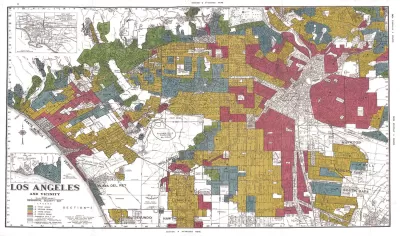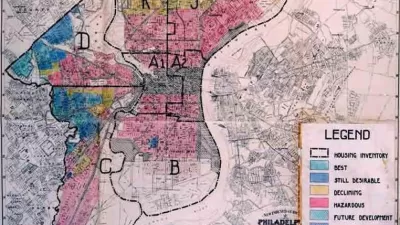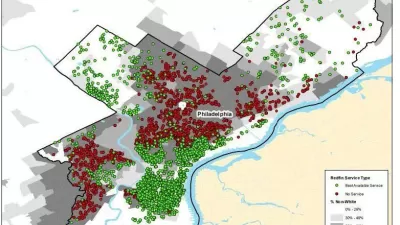President and CEO of the Lincoln Institute of Land Policy Dr. George McCarthy traces the legacy of racist policy and offers guidance toward an economic recovery that begins to undo systemic racism.

In a recent article detailing the historical relationship between racism and land policies, Dr. George McCarthy, president and CEO of the Lincoln Institute of Land Policy, describes the legacy of color-coded redlining maps created during the Great Depression. These secret documents spun up by the Home Owners' Loan Corporation (HOLC) delineated the segregation of opportunity in lending decisions where "neighborhoods that were home to high proportions of people of color or Eastern or Southern European immigrants were always shaded red, regardless of the quality of the homes or the local economy," according to McCarthy. The implication of the red shading was a lack of access to government-backed loans, and in turn, the loss of opportunity for homeownership in the redlined communities.
McCarthy says that the HOLC's maps "deepened the racial and economic divides that have been the subject of recent demonstrations in our cities and those of other countries," and presaged the destruction of Black neighborhoods by the U.S. interstate highway system and urban renewal.
As the United States and the world reckon with another economic depression, economic recovery must rectify the systemic racism made possible by unjust, discriminatory land policy, writes McCarthy. "We cannot make the same mistakes we made in the 1930s—allowing the urgency of the moment to give cover to policies that maintain racial discrimination—nor can we take actions like we did in the Great Recession, prioritizing the wealth and survival of corporations over some communities."
FULL STORY: President's Message: Think Land Policy Is Unrelated to Racial Injustice? Think Again.

Maui's Vacation Rental Debate Turns Ugly
Verbal attacks, misinformation campaigns and fistfights plague a high-stakes debate to convert thousands of vacation rentals into long-term housing.

Planetizen Federal Action Tracker
A weekly monitor of how Trump’s orders and actions are impacting planners and planning in America.

Chicago’s Ghost Rails
Just beneath the surface of the modern city lie the remnants of its expansive early 20th-century streetcar system.

Bend, Oregon Zoning Reforms Prioritize Small-Scale Housing
The city altered its zoning code to allow multi-family housing and eliminated parking mandates citywide.

Amtrak Cutting Jobs, Funding to High-Speed Rail
The agency plans to cut 10 percent of its workforce and has confirmed it will not fund new high-speed rail projects.

LA Denies Basic Services to Unhoused Residents
The city has repeatedly failed to respond to requests for trash pickup at encampment sites, and eliminated a program that provided mobile showers and toilets.
Urban Design for Planners 1: Software Tools
This six-course series explores essential urban design concepts using open source software and equips planners with the tools they need to participate fully in the urban design process.
Planning for Universal Design
Learn the tools for implementing Universal Design in planning regulations.
planning NEXT
Appalachian Highlands Housing Partners
Mpact (founded as Rail~Volution)
City of Camden Redevelopment Agency
City of Astoria
City of Portland
City of Laramie





























